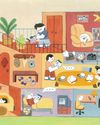
WHEN I WAS FOUR YEARS OLD, my family’s neighbourhood in Beirut turned into a battleground between the Palestinian Liberation Organization and the Israeli military, and so we left Lebanon. It was 1982, and the country had already experienced seven years of civil war; there was nowhere for us to go but the sea. We slept atop a crowded ferry deck in two foldout beach chairs, our suitcases leaning against us, as we made our way to Greece.
During our first months in Athens, I spent my mornings standing out on the balcony of our apartment, studying the busy street below. As lunch approached and the days grew hot, the stores closed one by one. The shopkeepers stopped shouting at beggars and locked their doors, disappearing into the dark recesses of their living quarters. While everyone else slept through the sun-baked afternoons, I watched cartoon animals speak in Greek overdubs I could not understand.
I did a lot of staying quiet in those days. We still carried with us a stench of war. My parents instructed me to not open my mouth in public, to try to blend in as much as possible. My father had hastily arranged for us to sit out the siege of Beirut by securing work at his advertising agency’s small Greek office, but we didn’t know how long the company would allow us to stay. We had brought only our clothes and some photo albums with us. Everything else had been left behind.
In the long Athenian dusk, the city’s streets became busy again when shopkeepers and residents took advantage of the cooler air. One evening, to lighten our moods, my father decided to take us to a night market, where locals would gather to socialize and stroll after slow days at work.
This story is from the July/August 2020 edition of The Walrus.
Start your 7-day Magzter GOLD free trial to access thousands of curated premium stories, and 8,500+ magazines and newspapers.
Already a subscriber ? Sign In
This story is from the July/August 2020 edition of The Walrus.
Start your 7-day Magzter GOLD free trial to access thousands of curated premium stories, and 8,500+ magazines and newspapers.
Already a subscriber? Sign In

Invisible Lives
Without immigration status, Canada's undocumented youth stay in the shadows

My Guilty Pleasure
"The late nights are mine alone, and I'll spend them however I damn well please"

Vaclav Smil Is Fed Up
The acclaimed environmental scientist is criticizing climate activists, shunning media, and stepping back just when we need him most

It's Time for a Birth Control Revolution
What the pill teaches us about the failure - and future - of women's health care

Would You Watch a Play about Hydro Electricity?
How documentary theatre struck a chord in Quebec

Still Spinning
One record chain has bet big on a new appetite for physical media

Just So You Know, I Love My Mother
In many ways, multi-generational living makes sense. But that doesn't make it easy

Art of the Steal
Why are plundered African artifacts still in Western museums?

Canada in the Middle
What role can we play in easing the war in Gaza?
Canadian Multiculturalism: A Work in Progress
As we mark fifty years since the adoption of Canada’s federal multiculturalism policy, human rights advocate AMIRA ELGHAWABY celebrates its merits and reflects on the work that is yet to be done when it comes to inclusion, acceptance, and fighting systemic racism in our country.